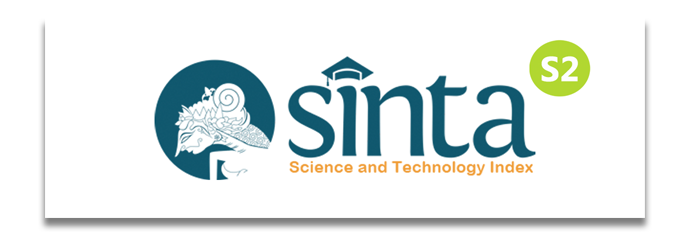The Effect of Alpha Mangostin on The Expression of TGF-β1, SMAD3, Type I Collagen, Proliferation and Migration of Keloid Fibroblasts
Downloads
Background: Keloid is a process of abnormal collagen thickening during wound healing in skin tissue accompanied by the formation of new blood vessels. Many keloid therapy modalities have been developed but the recurrence rate of those treatment still ranged 1-70%. Herbal plants have been developed for various types of treatment, one of which is for treating keloids. Purpose: The alpha mangostin content in mangosteen peel is known to have antifibrotic properties, further research is needed regarding the administration of alpha mangostin on the process of keloid occurrence. Methods: The investigation was conducted in vitro on phase III keloid fibroblast cells. There were two groups, which divided into the control groups and the treatment groups. The control groups and treatment groups were given alpha mangostin extract in concentrations of 20 μM; the sample of this study was 16. For each group after 24h of the incubation, fibroblast cell proliferation was measured by Microtetrazolium (MTT) assay, fibroblast cell migration was measured by scratch assay, SMAD3 expression was measured after immunocytochemical staining, and type 1 collagen was measured by Enzyme-Linked Immunosorbent Assay (ELISA). The Ethics Committee at the Research Ethics Commission of Faculty of Medicine Andalas University has reviewed this research. Result: Alpha mangostin can reduce the average expression of TGF-β1, SMAD3 expression, type 1 collagen, proliferation, and migration. . Conclusion: At concentration of 20 μM, alpha mangostin suppressed TGF-β1 expression, SMAD 3, collagen type 1, proliferation, and migration in keloid fibroblast cell.
Zhang M, Chen H, Qian H, Wang C. Characterization of the skin keloid microenvironment. Cell Commun Signal. 2023;21(1):1-11.
Walsh LA, Wu E, Pontes D, et al. Keloid treatments: an evidence-based systematic review of recent advances. Syst Rev. 2023;12(1).
Ogawa R, Dohi T, Tosa M, Aoki M, Akaishi S. The latest strategy for keloid and hypertrophic scar prevention and treatment: The nippon medical school (NMS) protocol. J Nippon Med Sch. 2021;88(1):2-9.
Klomparens K, Simman R. Treatment of keloids: A Meta-analysis of Intralesional Triamcinolone, Verapamil, and Their Combination. Plast Reconstr Surg - Glob Open. 2022;10(1):E4075.
Chaiwarit T, Kantrong N, Sommano SR, et al. Extraction of tropical fruit peels and development of hpmc film containing the extracts as an active antibacterial packaging material. Molecules. 2021;26(8).
Ray S, Das J, Pande R, Nithya A. Swati Ray 1 , Joyati Das 2* , Ranjana Pande 3 , and A. Nithya 2. Identification of risk sources in mangosteen production: a case study in the pauh thematic village, padang city. 2023:195-222.
Bi C, Xu H, Yu J, Ding Z, Liu Z. Botanical characteristics, chemical components, biological activity, and potential applications of mangosteen. PeerJ. 2023;11.
Suhandi C, Wilar G, Narsa AC, et al. Updating the pharmacological effects of α-mangostin compound and unraveling its mechanism of action: A Computational Study Review. Drug Des Devel Ther. 2024;18(October 2024):4723-4748.
Lee JH, Massagué J. TGF-β in developmental and fibrogenic EMTs. Semin Cancer Biol. 2022;86(Pt 2):136-145.
Li T, Zhang M, Li Y, et al. Twist-related protein 1 promotes transforming growth factor β receptor 1 in keloid fibroblasts via regulating the stability of myocyte enhancer factor 2A. Burn trauma. 2024;12:tkae024.
Lee YH, Hsieh PL, Chao SC, Liao YW, Liu CM, Yu CC. α-Mangostin inhibits the activation of myofibroblasts via downregulation of linc-ROR-mediated TGFB1/Smad signaling. Nutrients. 2023;15(6).
Xu Y, Wu J, Gao L, et al. α-Mangostin reduces hypertension in spontaneously hypertensive rats and inhibits EMT and fibrosis in Ang II-induced HK-2 cells. Int J Med Sci. 2024;21(9):1681-1688.
McFarland K, Hahn JM, Combs KA, Supp DM. Antiproliferative, proapoptotic, and potential antifibrotic effects of α-mangostin in fibroblasts from keloid lesions and normal skin. 2021;96(4):1136-1156.
Li RS, Xu GH, Cao J, et al. Alpha-mangostin ameliorates bleomycin-induced pulmonary fibrosis in mice partly through activating adenosine 5′-monophosphate-activated protein kinase. Front Pharmacol. 2019;10(November).
Adenina S, Rahmaniah R, Yuyuntia Y, Soetikno V, Louisa M. The effect of alpha-mangostin on transforming growth factor beta 1 (Tgf-Β1) and matrix metalloproteinase-3 expression in Tgf-Β-induced hepatic stellate cells. Int J Appl Pharm. 2019;11(1):177-180.
Wang Y, Yang H, Su X, et al. TGF-β1/SMOC2/AKT and ERK axis regulates proliferation, migration, and fibroblast to myofibroblast transformation in lung fibroblast, contributing with the asthma progression. Hereditas. 2021;158(1):1-9.
Phimnuan P, Dirand Z, Tissot M, et al. Beneficial effects of a blended fibroin/aloe gel extract film on the biomolecular mechanism(s) via the MAPK/ERK pathway relating to diabetic wound healing. ACS Omega. 2023;8(7):6813-6824.
Copyright (c) 2025 Berkala Ilmu Kesehatan Kulit dan Kelamin

This work is licensed under a Creative Commons Attribution-NonCommercial-ShareAlike 4.0 International License.
- Copyright of the article is transferred to the journal, by the knowledge of the author, whilst the moral right of the publication belongs to the author.
- The legal formal aspect of journal publication accessibility refers to Creative Commons Atribusi-Non Commercial-Share alike (CC BY-NC-SA), (https://creativecommons.org/licenses/by-nc-sa/4.0/)
- The articles published in the journal are open access and can be used for non-commercial purposes. Other than the aims mentioned above, the editorial board is not responsible for copyright violation
The manuscript authentic and copyright statement submission can be downloaded ON THIS FORM.















